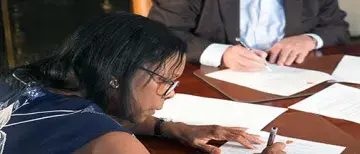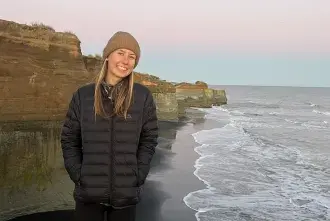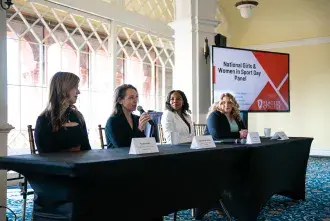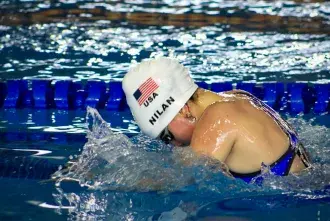
Bermuda College, the sole institute for higher education on the north Atlantic island, is a two-year community college offering students coursework toward associate’s degrees. To streamline their graduated students’ path toward obtaining bachelor’s degrees, the community college has developed an extensive global network of transfer agreements like the one Flagler formally established on Oct. 26.
What makes articulation agreements like this an especially attractive pathway for students is the contractual guarantee between institutions that applicable credits will be properly transferred toward the degree they’re seeking.
Bermuda College Vice President of Academic and Student Affairs, Phyllis Curtis-Tweed, said this particular agreement is a “two plus two” pathway with Flagler’s Business Administration, Education, Hospitality and Tourism Management, and Coastal Environmental Science programs.
“The student who completes their associate’s degree at Bermuda College can then matriculate into the related baccalaureate program at Flagler, and it will only take two years to complete the program,” Curtis-Tweed said.
Compared to the 36 other institutions they have signed similar agreements with, Curtis-Tweed said Flagler College seems like a particularly “excellent fit,” for their graduates to continue in higher education.
“The next step for us is to make sure that students are very much aware of this opportunity,” she said. “Not just the opportunity because that’s what all of the institutions have in common, but that they are aware of the advantages of coming here as opposed to going elsewhere.”
She pointed toward climate similarities, equally robust oceanic science opportunities, and comparable tourism industries. But it’s the small, nurturing environment that Curtis-Tweed said is a particularly valuable quality of Flagler.
“Having a nurturing community is very important and it’s also what they’re used to at Bermuda College, and so I think that makes coming to Flagler a very attractive prospect,” Curtis-Tweed said.
The roots of this articulation agreement were informally established before the pandemic in 2019 when the first Bermuda College student enrolled at Flagler through the Coastal Environmental Science program. But the pandemic threw a wrench in efforts to advance this collaboration.
“She came, had a fabulous experience, and graduated but Covid hit during that time, so we weren't able to go back to Bermuda and their students weren't able to come here just because of the circumstances,” Deborah Thompson, Flagler’s vice president of enrollment management, said. “But since we have weathered the pandemic and travel is opening up, we wanted to renew our relationship and have the chance to expand the opportunities for students to transfer to Flagler from Bermuda College.”
Even before the first Bermuda College student came to Flagler, there was already a strong connection between Flagler’s Coastal Environmental Science program and Bermuda’s Marine Science program.
Thompson said it was College donor James Babcock who first facilitated introductions to Bermuda College.
Babcock is a steady proponent of Flagler’s Coastal Environmental Science (CES) program and has strong ties in Bermuda. Thompson said Babcock has a “long commitment” to the island, serving on the board of the Bermuda Aquarium, Museum & Zoo.
In 2014, Babcock facilitated a partnership between the aquarium and Flagler’s CES program to host students for a study abroad summer course that he funded. The trip, which continued as an annual program offering in subsequent years through Babcock’s funding, was led by Terri Seron and Barbara Blonder, associate professors of natural sciences
“Bermuda is such a unique and special island to me,” Seron said in a 2014 interview with the Bermuda Zoological Society. “I previously spent three summers on the island taking courses and participating in coral research, and I was absolutely thrilled to return to Bermuda many years later with my students to pass on my love for Bermuda. The Flagler students understand the environmental pressures and problems that our coral reefs are facing, and that knowledge gives me hope for the future.”
Thompson explained that the study abroad course is a two-week trip where students snorkel and scuba dive to study the island’s coral reef and historical shipwrecks.
“It’s an opportunity for them to gather research from that part of the world,” she said.
This fieldwork in Bermuda’s ocean is the basis for a research project students present at the end of this trip.
“We invite our colleagues from Bermuda College so that they can see the research that our students are doing and that our students have an opportunity to present to a larger group,” Thompson said.
In addition to continuing their annual summer CES trip to Bermuda, Thompson is hopeful Flagler will be able to cultivate internship and study abroad opportunities through Bermuda’s hospitality and tourism industry. This includes establishing a relationship with the Hamilton Princess resort there which Bermuda College already maintains strong ties.
These opportunities for Flagler students in Bermuda are part of what Thompson said makes this such a special collaboration.
“It's a wonderful opportunity to continue to build on opportunities for our students to go to Bermuda and then for us to attract students from Bermuda College,” she said.



